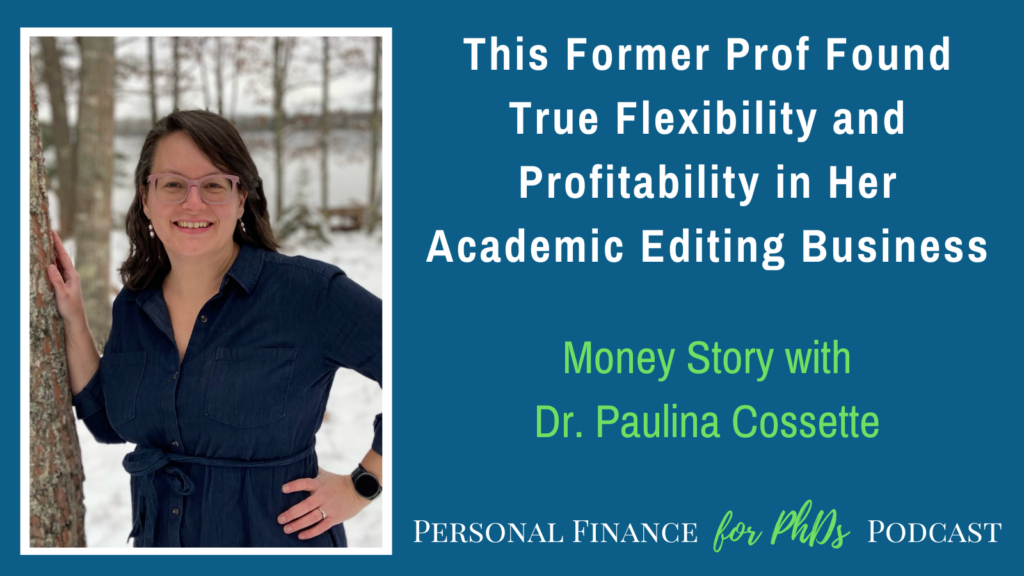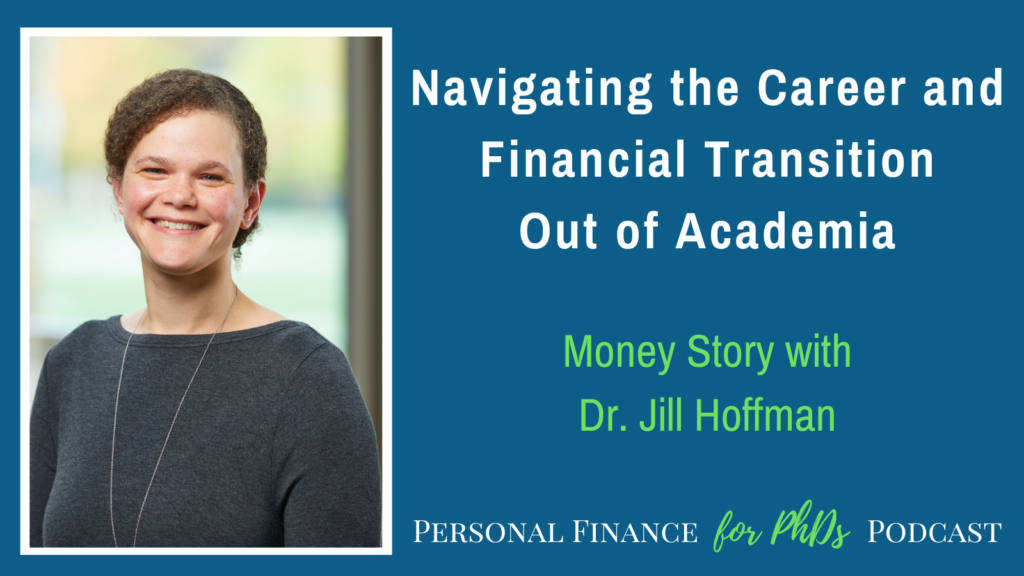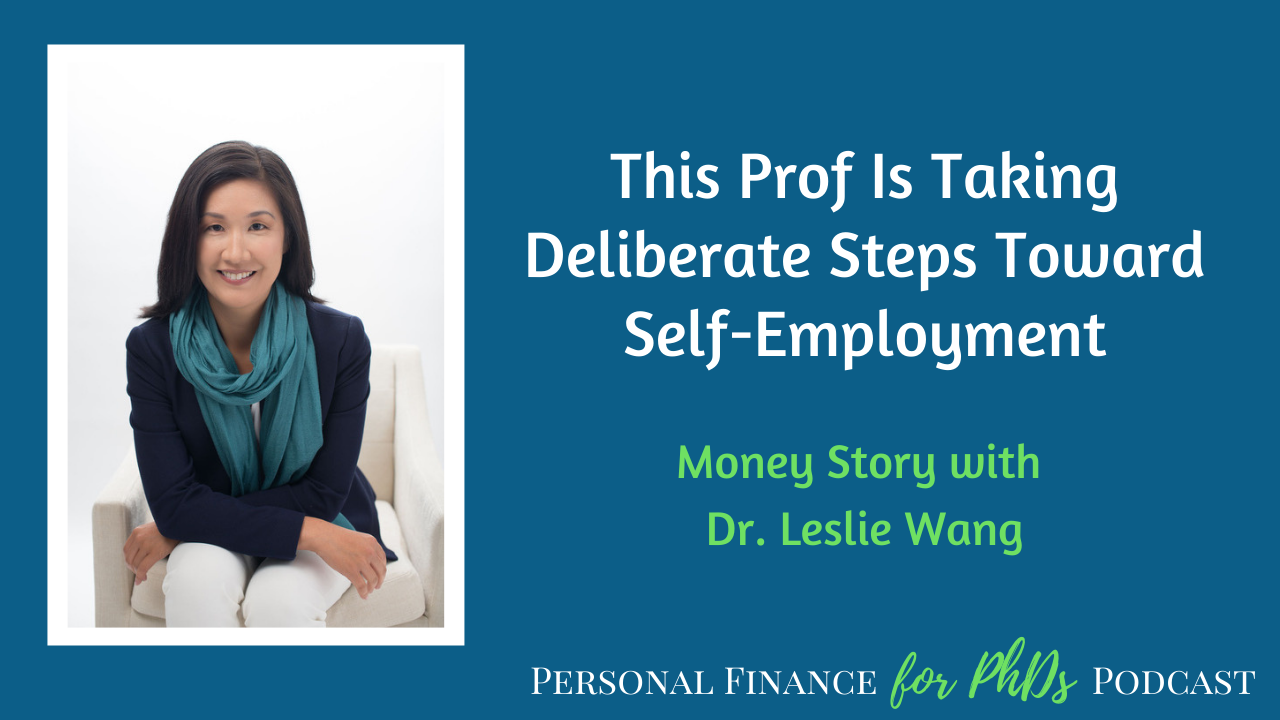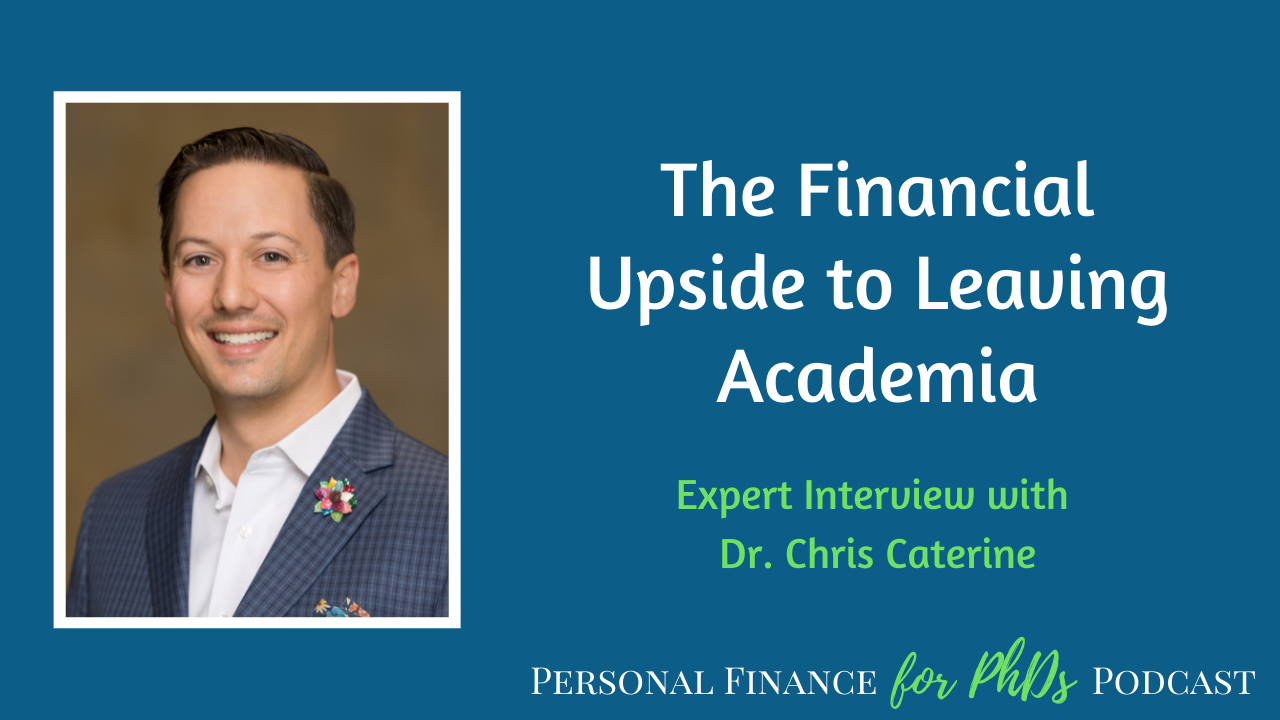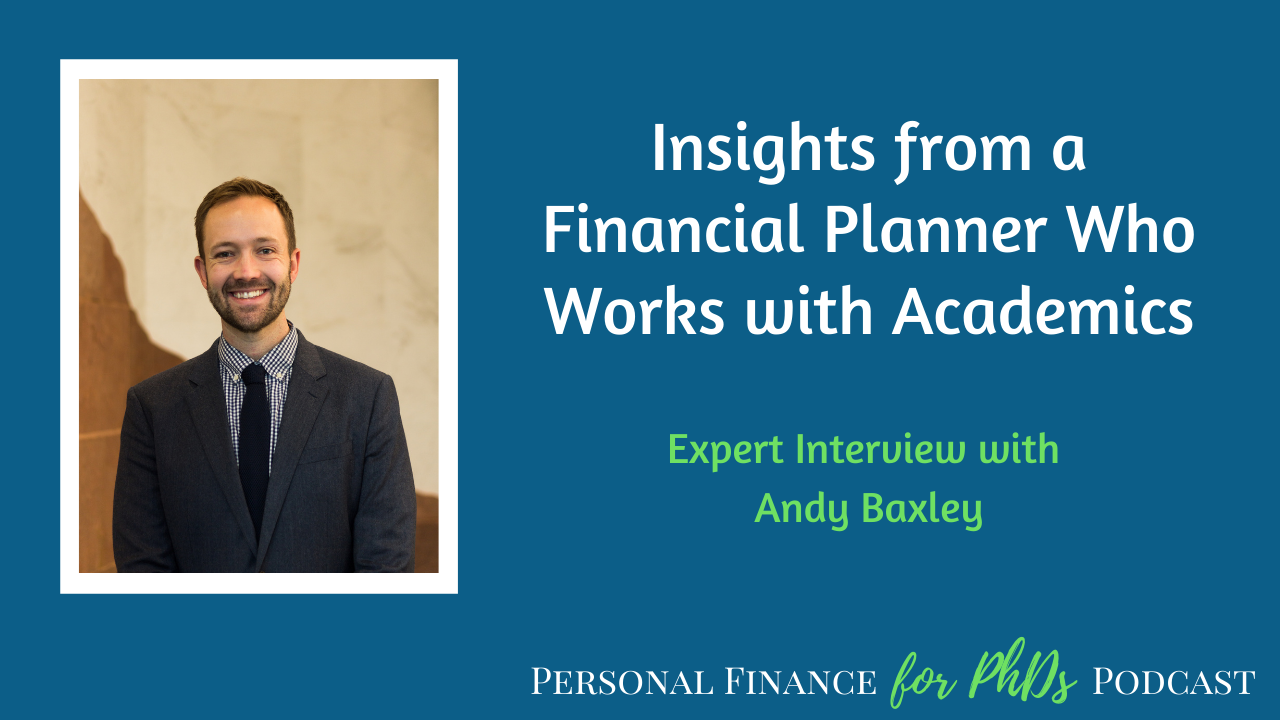Emily published the first episode of this podcast in July 2018. This is the 223rd episode, and over the last six and a half years, the podcast has featured over 300 unique voices in addition to my own. For our last episode in 2024, we are catching up with the guests from Seasons 12 through 14, and a few from earlier seasons as well. The guests were invited to submit short audio clips to update us on how their lives and careers have evolved since the time of their interview, as well as to provide their best financial advice if that has changed since that initial interview.
Links mentioned in the Episode
- PF for PhDs Podcast Hub
- PF for PhDs Subscribe to Mailing List
- PF for PhDs Excel Spending Tracker
- PF for PhD Website
- Emily’s E-mail Address
- Sam Hogan (from PhD Home Loans): Season 2, Episode 5; Season 5, Episode 17; Season 8, Episode 4; Season 13, Episode 1
- Dr. Tina Del Carpio: Season 6, Episode 10
- Dr. Gertrude Nonterah (from The Bold PhD): Season 8, Episode 6
- Dr. Alana Rister (from Science Grad School Coach): Season 10, Episode 4
- Dr. Jay Zigmont (from Child Free Wealth): Season 12, Episode 1
- Dr. Inga Timmerman (from Attainable Wealth Financial Planning): Season 12, Episode 3
- Dr. Haley Sanderson: Season 12, Episode 4
- Brittany Trinh (from Beyond Your Science Podcast): Season 14, Episode 4
- Host a PF for PhDs Tax Seminar at Your Institution
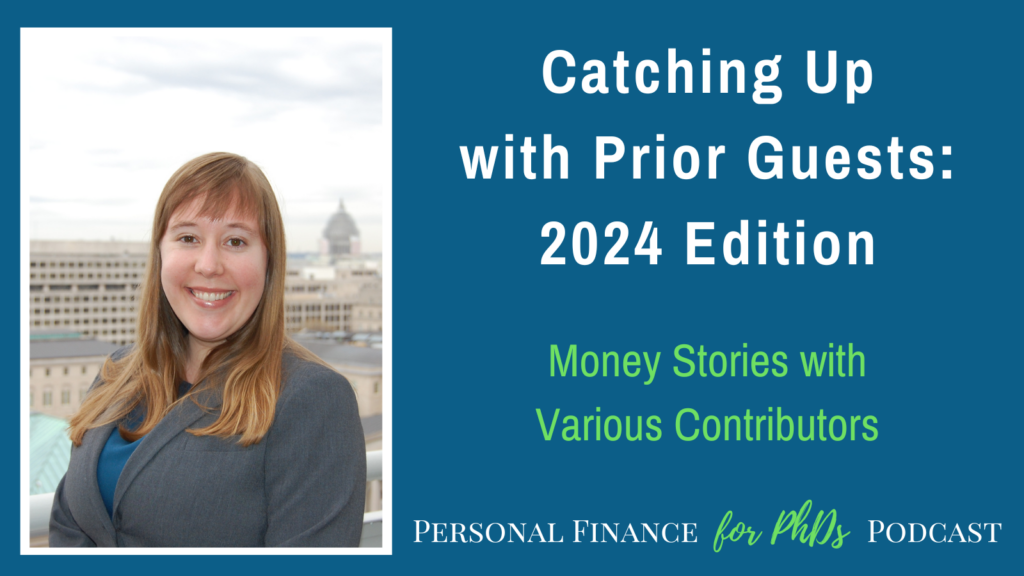
Teaser
Jay Z (00:00): What do I do if the path I’ve bet on, the money disappears? It’s just one of those things you gotta think about in which probably nobody wants to think about and that’s a reality check.
Introduction
Emily (00:16): Welcome to the Personal Finance for PhDs Podcast: A Higher Education in Personal Finance. This podcast is for PhDs and PhDs-to-be who want to explore the hidden curriculum of finances to learn the best practices for money management, career advancement, and advocacy for yourself and others. I’m your host, Dr. Emily Roberts, a financial educator specializing in early-career PhDs and founder of Personal Finance for PhDs.
Emily (00:47): This is Season 19, Episode 9, and today I am featuring many guest voices! I published the first episode of this podcast in July 2018. This is the 223rd episode, and over the last six and a half years, the podcast has featured over 300 unique voices in addition to my own. For our last episode in 2024, we are catching up with the guests from Seasons 12 through 14, and a few from earlier seasons as well. I invited them to submit short audio clips to update us on how their lives and careers have evolved since the time of our interview, as well as to provide their best financial advice if that has changed since our initial interview. You are going to hear a common theme throughout many of today’s audio segments. The audio clips in this episode are ordered by when the original episode was published. If you’d like to circle back and listen to any of the previous interviews, you can do so in your podcatcher app or at my website, PFforPhDs.com/podcast. To keep up with future episodes, please hit subscribe on that podcatcher and/or join my mailing list at PFforPhDs.com/advice. You’ll hear an update from me first, followed by the rest of the guests. You can find the show notes for this episode at PFforPhDs.com/s19e9/. Happy listening, happy holidays, and happy new year! See you in 2025!
Dr. Emily Roberts
Emily (02:23): Hi! This is Emily Roberts from Personal Finance for PhDs. I am of course the host of this podcast and you hear from me in every episode! My update last year at this time was a bit of a downer, and I’m pleased to report we’ve had a much better year overall in 2024. Some personal highlights from this year included: living and working from my parents’ house for a month over the summer and meeting my new nephew, vacationing in Hawaii for the first time, attending Family Camp in Sequoia National Park for the third time, camping with my daughter’s Girl Scout troop several times, including a Roar & Snore at the San Diego Zoo, seeing Hamilton in Los Angeles, and becoming a regular at Orange Theory Fitness. My husband and I also purchased our very first new car, an electric vehicle, and are enjoying having two cars at our family’s disposal. My daughters are doing really well in school and having fun in their extracurriculars. We’ve continued our family traditions of reading together—I’ve read 61 books so far this year—and playing strategy board games like Dominion and Ticket to Ride. Despite some personal health challenges, it’s been a great year.
Emily (03:40): As for Personal Finance for PhDs the business, I’m really pleased with how the year evolved. Over the summer, I revamped all of my live seminars to be true workshops, and my clients and audiences have responded quite positively. I believe this teaching style is more effective than my previous one, and the template spreadsheets and worksheets that I provide have been appreciated. My clients are also getting back to hosting me in person more so than in previous years, which is my preference by far. In 2024, I delivered workshops in person at Yale University, the University of California at Los Angeles, The Scripps Research Institute, the University of California at San Diego, Michigan State University, and Boston University, and all the engagements were delightful. I also attended two conferences, the Graduate Career Consortium in Philadelphia and the Higher Education Financial Wellness Summit in Pittsburgh. The business revenue and my income are up over 2023’s numbers, though I’m still gunning to get back to where they were in 2022. In 2024, my family has made great use of the manual expense tracker that I mentioned in last year’s update, which incorporates some of the principles I teach in my workshops. If you’d like to download the tracker, please register for the Personal Finance for PhDs mailing list through PFforPhDs.com/tracker/. Thanks for listening to my update! If you want to get in touch, you can visit my website at PFforPhDs.com or email me at [email protected].
Sam Hogan
Sam H (05:18): Hello, this is Sam Hogan. I’m the mortgage originator who specialize in graduate students and PhDs and Emily’s brother. I’ve given interviews on the podcast about various aspects of mortgage and home ownership for graduate students and PhDs in multiple seasons. Season two, episode five, season five, episode 17, season eight, episode four, and season 13, episode one. In 2024, I switched employers and I’m now with truist Bank. This has been exciting because truist offers a non repayable grant for down payment or closing cost assistance to low income borrowers in certain states that graduate students are perfect for. I’m currently exploring with them the possibility of extending doctor mortgages to PhDs as well as MDs. You can find more information about this in my mailing list or on Emily’s YouTube channel. In 2024. I also attended the National Post-Doctoral Association annual conference, which was great fun, and I plan to go back in 2025. If you happen to be there, please stop by my booth and say hi. On a personal note, 2024 has been incredible because my fiance and I had our first child, a healthy little boy named Grant. If you’d like to learn more about mortgages that I offer or have a question about the lending process, you can call or text me at (540) 478-5803 or email me at [email protected]. If you’d like to download a free PhD friendly mortgage guide that I wrote, you can find it on my website, PhDhomeloans.com. Rates are expected to keep coming down through 2026, so this is a great time to get in touch.
Dr. Tina Del Carpio
Tina DC (06:57): Hi, my name is Tina Del Carpio. I was a guest on season six, episode 10 talking about figuring out my life after a broken engagement in Los Angeles. I’m happy to report that last December in 2023, I finished my PhD and I started a job as a data analyst for the state, and I’m really happy with my job and with where I’m at. Um, the pay is not as good as it could be an industry, but I work fully remotely and that’s such a huge benefit to me. Um, the more important life update is that this past November I got married to my partner Tess and I still live in Los Angeles, but now with Tess and our three cats, Tuka, Gem, and Goose. So all is well here.
Dr. Gertrude Nonterah
Gertrude N (08:00): Hello Emily and the personal finance for PhD’s podcast team. And thank you for giving me this opportunity. My name is Gertrude Nonterah and I run theboldphd.com. I was interviewed, um, on this podcast in February of 2021. It was episode six, season eight, I believe, season eight, episode six, and we talked about personal branding and how to use that to land a job and also build a business as a PhD or academic. And since then I have continued to talk about personal branding and have the opportunity to speak at over 20 universities in different countries on the topics of personal branding, career change, and also my own career within medical communications and the biotech space. My best financial advice for early career PhDs is to really begin to think about investments early on, right? I am in my early forties. I turned 41 this year and a part of me wishes I knew what I knew now about investing when I was in graduate school because it’s only recently in the past, let’s say five years, that it has occurred to me that in graduate school I could have been putting away $20 here and $10 there and I could have actually started building investments at that time. Instead, I started in my thirties, which was later than I hoped, but it’s still better to start than never to start, right? And so if you are starting out your career, use your career as a launchpad to start funding investments. Learn about the different investments that are out there and how you can get started with them. You know, do your due diligence and start building wealth because it’s going to compound over time and every year you don’t invest, you are losing money, but every year you do invest, you are compounding it and, and that’s what’s exciting about investing. So that would be my best piece of advice for early career PhDs. If you wanna find me, you can go to my website, it’s theboldphd.com. You can also find me on LinkedIn, Gertrude Nonterah PhD.
Dr. Alana Rister
Alana R (10:19): Hi, I’m Alana Rister and I was on personal finance for PhDs Season 10, episode four. I am the founder of science grad school coach and when I was on the podcast, I talked about how I had worked through grad school in order to pay off about $13,000 of student loan debt from my undergraduate loans. Since then, I have become a full-time data scientist in a Fortune 500 company and I have been able to actually pay off an additional $40,000 of my undergraduate student loan debt. At this point, with my current plan, I’m about one year from actually having all of my student loan debt paid off, and when I graduated, I graduated with about $70,000 of student loan debt. My best financial advice moving forward, especially from the experiences that I’ve had since um, graduating grad school, is while you’re in grad school, start thinking about retirement, especially if you’re in the US and think about the different accounts that you might want to work with. Then when you’re in grad school, you typically have a lower income. So if you have any bandwidth within your income to set aside for retirement, you’re going to have, um, certain tax advantaged accounts in the US that you might not be able to fully use whenever you are fully fledged into a job, um, your income might be too high. So I really wish I would’ve taken more advantage of retirement and wouldn’t have that stress on my income now. Um, looking forward to trying to retire within the US at least. If you’re interested to find me, you can look at my YouTube channel @scigradcoach. Thanks again for having me and letting me share my update.
Dr. Jay Zigmont
Jay Z (12:22): Hi, I am Jay Zigmont. I am the founder and CEO of Child Free Wealth, a financial planning firm dedicated to serving child free childless folks. My PhD is in adult learning from the University of Connecticut and I joined the podcast on, let’s see, season 12, episode one. It talked about the garden and the rose and how do dual career couples, figure out the balance between the trailing spouse in the other job and the balance between those two. In the time since then, uh, as any good PhD, I spent the time doing a lot of research and writing. Uh, really excited. At the end of this year, I have a new book coming out, the Child Free Guide to Life and Money. It’s been interesting working with publishers and working through the process and it’s gotten super interesting because of politics. Let’s be real this year, been a lot of discussion about the childless cat ladies and the good, bad and ugly goes there. Uh, it it’s, it’s one of those things when you’re writing about a topic and you’re like, Hey, I can help a lot of people, but you’re not always ready for the politics, the judgments, the social media. I dunno, I’m learning all that. I think my big advice because of the season we’re in right now for PhDs is you need to think about a backup plan if you’re funding goes away. And that sounds a, I mean that’s always been the case. What happens to grant money? But right now when we’re talking about federal funding or departments possibly not existing and the changes, it’s tough. You know, my wife and I have had to have this discussion ’cause her work is in food insecurity and, uh, all of it’s federally funded or most of it is, and it’s one of those things like, oh, what do I do if the path I’ve bet on the money disappears. Luckily for us as a couple, we’re at a good financial place. We don’t have any debt, you know, we’ve got a emergency savings, we can do different things, but it’s just one of those things you gotta think about in which probably nobody wants to think about, but it’s a reality check. You can find me online, childfreewealth.com. You can buy the book anywhere you like. Uh, always love go to independent bookstores and on all the socials at @ChildFreeWealth.
Dr. Inga Timmerman
Inga T (14:46): Hello professors and new PhDs. My name is Inga Timmerman and I was in season 12, episode three. I’m a financial planner who works exclusively with other academics and I’m also an academic. And the best advice I have for new PhDs and this advice has changed since the last time I talked to Emily is that instead of focusing on long-term financials, focus on the intermediate term. Plan your life in the two to five year increments rather than what’s going to happen 20 years down the um, road. What I’ve noticed more and more in the last few years is that professors no longer stay in the same academic job for for the entire career. They move a lot more, they quit academia a lot more. So focusing on the best financial decision for the next two to five years ends up being better long term than trying to guess where you’re going to be in 20 years. The newest thing I have is, um, a brand new podcast for academics is going to come in January, 2025, it’s going to be called Academics and Their Money. And I hope to have all of you as my listeners. If you need any more financial advice, please visit my website at attainablewealthfp.com.
Dr. Haley Sanderson
Haley S (16:01): Hi, I am Dr. Haley Sanderson from episode four, season 12. I’ve been pretty busy since my episode was taped. I finished my two year postdoc at the Vaccine Infectious Disease Organization at the University of Saskatchewan. At that point, I reached the five year limit for postdocs, but before my contract ended, I landed a permanent job as a bioinformatics programmer at agriculture in AgriFood Canada. So I finished my postdoc and then two weeks later I started a job with the federal government. Um, and that job pretty much doubled my salary. I also had my own BioMAT bioinformatics freelance business for about a year. Uh, my mental health has also improved steadily over the years and I haven’t had a major psychotic episode in years and I’m just a lot happier now. Um, right now I’m working on training for promotion at work, um, enjoying the stability that the job I have now provides and saving to buy a condo close to my family. My best financial advice for early career PhDs is to avoid staying in academia for too long and maybe even avoiding postdocs altogether unless you’re learning a new skill that’s transferable to other sectors. Um, try to avoid getting stuck in the academic job market because you can be successful in a lot of different places and always look for how your skills can be used and how they can be more valuable elsewhere. Uh, thanks. Bye.
Brittany Trinh
Brittany T (17:51): Hi everyone, my name is Brittany Trinh and I am the host of the Beyond Your Science podcast. I was previously on PF for PhDs, um, in season 14, episode four where I talked about deferring my graduate school acceptance to work on my finances. Since the last episode, I have now started my own podcast called The Beyond Your Science Podcast, where I talk about science, creativity, and entrepreneurship and what that looks like for people in stem. I also used to work with clients one-on-one and provided workshops on website design, but since then I have shifted away from that model and started working, um, more on the backend side of things where I am collaborating with Jennifer van Alstyne of the academic designer in team VIP days. And in a team VIP day, um, we work together to design a website in one day. In my episode, I shared some advice about using your skills to create extra income and I still stand by that. Um, so an a new piece of advice that I’d like to share is to make sure that, um, when you transfer your 401k from a previous employer, um, is number one, to not avoid it, uh, just call the company and they will help you transfer it into a Vanguard account. And number two is once it does hit your Vanguard account, um, make sure that it is sitting in an actual mutual fund or ETF and being invested and not just sitting in a money market fund. And I’m sharing this advice because this is something that happened to me recently. I was pretty avoidant about calling the, um, 401k company, but it was only like a 30 minute call. And then, um, when I finally did get it transferred over, I assumed it would just be transferred into a mutual fund. And I didn’t really know how the Vanguard website worked until recently and I have now learned that my funds were not being invested anywhere. Um, but you know what we learned from the experience and now I’m sharing that with you all. Um, so that hopefully you don’t make the same mistake. If you would like to connect with me, you can find me on LinkedIn at Brittany Trinh, that’s T-R-I-N-H or on my website brittanytrinh.com for more info about my podcast Beyond your Science and other website Design Tips.
Outtro
Emily (20:35): Listeners, thank you for joining me for this episode! I have a gift for you! You know that final question I ask of all my guests regarding their best financial advice? My team has collected short summaries of all the answers ever given on the podcast into a document that is updated with each new episode release. You can gain access to it by registering for my mailing list at PFforPhDs.com/advice/. Would you like to access transcripts or videos of each episode? I link the show notes for each episode from PFforPhDs.com/podcast/. See you in the next episode, and remember: You don’t have to have a PhD to succeed with personal finance… but it helps! Nothing you hear on this podcast should be taken as financial, tax, or legal advice for any individual. The music is “Stages of Awakening” by Podington Bear from the Free Music Archive and is shared under CC by NC. Podcast editing by Dr. Lourdes Bobbio and show notes creation by Dr. Jill Hoffman.
